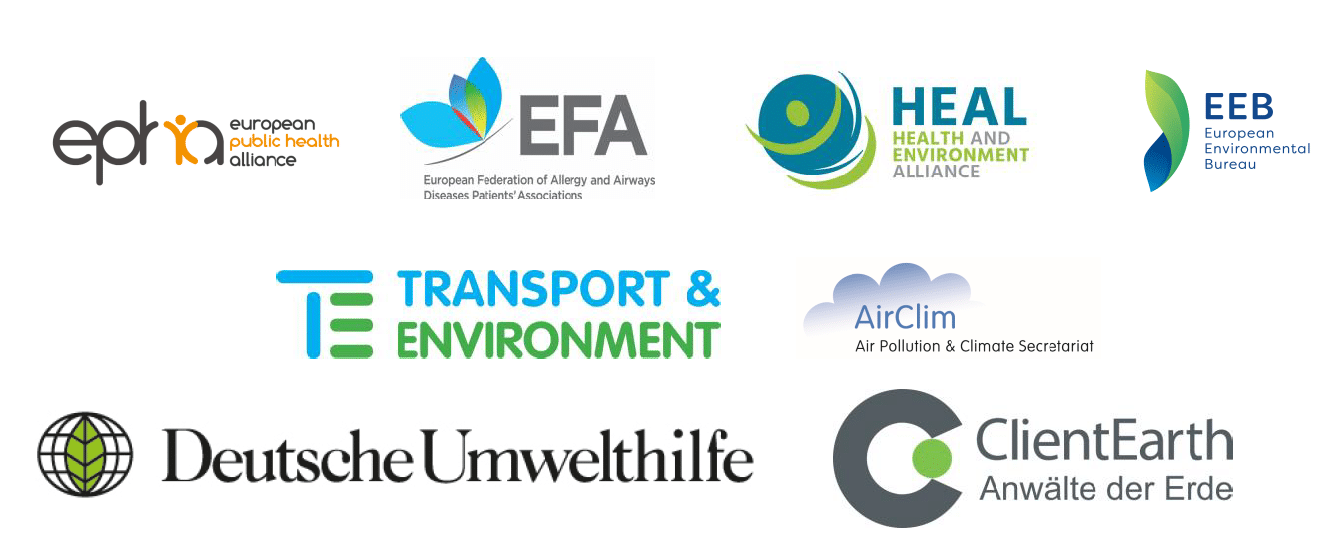
To: Chancellor Angela Merkel
CC: Ministers Svenja Schulze, Andreas Scheuer, Jens Spahn
CC: EU Commission President Jean-Claude Juncker, First Vice-President Frans Timmermans, EU Commissioners Karmenu Vella, Vytenis Andriukaitis, Violeta Bulc
CC: Dr. Tedros Adhanom Ghebreyesus, Dr. Maria Neira, World Health Organization (WHO)
Open Letter by health, environmental, transport and legal civil society organisations, including asthma, chronic obstructive pulmonary disease (COPD) and cancer patients
Re: EU air quality laws protect our health – Germany must respect them
We are writing to express our deep concerns about attempts by a member of the German government to undermine EU air quality legislation – namely, the science-based limits on nitrogen dioxide (NO2).
Air pollution is the number one global environmental health threat, a leading risk factor for major chronic diseases including cancer, cardiovascular and respiratory diseases. In Germany alone, air pollution leads to 62,300 early deaths every year[1]. New studies also show a link between air pollution and obesity, diabetes and neurological conditions. Vulnerable groups such as children, the elderly, the poor, or those already ill are particularly at risk.
The body of evidence on the health impacts of air pollution is large and robust. The latest review of the science by the World Health Organization (WHO), the leading authority on this issue, showed that health effects of air pollution exposure can occur at even lower levels than previously thought. The range of proven health impacts is also continually expanding[2].
The health impacts of air pollution are costly for the European and national economies: the recent European Court of Auditors (ECA) report pointed out that the EU Commission estimated the total health related external costs of air pollution at between €330 and €940 billion per year[3].
The questioning of the evidence by a small minority goes against the scientific consensus about the detrimental and far-reaching health impacts of air pollution.
Regarding NO2 specifically, there is now considerable research demonstrating short- and long-term health impacts, occurring at lower pollution concentrations than the current EU limit value. For this reason, the World Health Organization is expected to tighten its NO2 limit recommendations in the near future.
Last week’s letter from your government’s Transport Minister, Andreas Scheuer, to EU Transport Commissioner Bulc shows a worrying lack of commitment to tackling air pollution and protecting people’s health. It also sends the wrong signal for other EU countries as it implies that it is the German government’s official position and puts people’s health at serious risk.
Tens of German cities are still breaching the NO2 limit value eight years after its entry into force in 2010[4]. People in Germany, who have long been living with unlawful levels of air pollution, are paying the price for inaction, with their health being harmed and their government’s inaction infringing their right to breathe clean air. Meanwhile, the German health services bear the economic burden.
The action of a member of your government, and the silence of the health minister, suggest that the German government’s priority is not the protection of people’s health while the Court of Justice of the European Union is investigating Germany for its continued non-compliance with air quality laws.
There are many possible measures in the transport and mobility sector that will boost health, reduce air pollution and help mitigate climate change. The solution to Germany’s air quality crisis is not to try and soften the laws that protect people’s health; it is to finally take action for cleaner air.
The undersigned organisations therefore urge the German government to refrain from any attempts to weaken air quality standards.
Instead, we call for a show of leadership on improving air quality in Germany – to protect people’s health and foster sustainable cities with a high quality of life.
In view of the public interest of this matter we intend to make this letter publicly available.
Sincerely,
Genon K. Jensen, Executive Director, Health and Environment Alliance (HEAL)
Fiona Godfrey, Secretary General, European Public Health Alliance (EPHA)
Susanna Palkonen, Director, European Federation of Allergy and Airways Diseases Patients’ Association (EFA)
Jeremy Wates, Secretary General, European Environmental Bureau (EEB)
Prof. Dr. Hermann Ott, Director, ClientEarth ‘Anwälte der Erde’
Jürgen Resch, Bundesgeschäftsführer, Deutsche Umwelthilfe (DUH)
Christer Ågren, Air Pollution Expert,The Air Pollution and Climate Secretariat
William Todts, Executive Director, Transport & Environment (T&E)
Hintergrund und Stellungnahmen
United Nations General Assembly Resolution (10 October 2018): Political declaration of the third high-level meeting of the General Assembly on the prevention and control of non-communicable diseases http://www.un.org/en/ga/search/view_doc.asp?symbol=A/RES/73/2
World Health Organization (WHO) on air pollution: https://www.who.int/airpollution/en/
World Health Organization (WHO)
Dr Tedros Adhanom Ghebreyesus, Chef der Weltgesundheitsorganisation (WHO) schreibt: ‚Air pollution is the new tobacco. Time to tackle this epidemic.’ Mehr hier
Hans Bruyninckx, Exekutiv-Direktor der Europäischen Umweltagentur (EEA): ‚Luftverschmutzung ist ein unsichtbarer Killer und wir müssen mehr tun, um die Ursachen zu bekämpfen. Bei Luftverschmutzung sind die Emissionen im Straßenverkehr oft die schädlichsten, da sie am Boden stattfinden und normalerweise in Städten vorherrschen, in der Nähe der Menschen.‘ Mehr hier
Forum Internationale Lungengesellschaften (FIRS)
Stellungnahme in der „Frankfurter Allgemeine Zeitung“ (27.1.2019)
Internationale Gesellschaft für Umweltepidemiologie (ISEE)
und European Respiratory Society (ERS)
Vorstand der Gesellschaft für Pädiatrische Pneumologie e.V. (GPP e.V.)
Deutsche Gesellschaft für Pneumologie und Beatmungsmedizin
Positionspapier zu Auswirkungen von Luftschadstoffen hier
Gesellschaft für Pädiatrische Pneumologie (GPP)
Äußerung zur Bewertung von Luftschadstoffen hier
Deutsche Gesellschaft für Epidemiologie (DGEpi), die Deutsche Gesellschaft für Medizinische Informatik, Biometrie und Epidemiologie (GMDS), die Deutsche Gesellschaft für Public Health (DGPH) und die Deutsche Gesellschaft für Sozialmedizin und Prävention (DGSMP)
Offener Brief/Stellungnahme hier
Footnotes
- EEA: Country factsheet Germany: https://www.eea.europa.eu/themes/air/country-fact-sheets/germany
- Review of Evidence on Health Aspects of Air Pollution, WHO REVIHAAP report: http://www.euro.who.int/en/health-topics/environment-and-health/air-quality/publications/2013/review-of-evidence-on-health-aspects-of-air-pollution-revihaap-project-final-technical-report
- European Court of Auditors: Special Report “Air Pollution: Our health still insufficiently protected” https://www.eca.europa.eu/en/Pages/DocItem.aspx?did=46723
- Latest UBA numbers: https://www.umweltbundesamt.de/presse/pressemitteilungen/stickstoffdioxidbelastung-geht-2018-insgesamt
Further reading
European Public Health Alliance (EPHA)
- Health impacts and health costs of diesel emissions in the EU
- Briefing | The Invisible Killer: the health burden from air pollution in Europe
Euroepan Respiratory Society (ERS)

